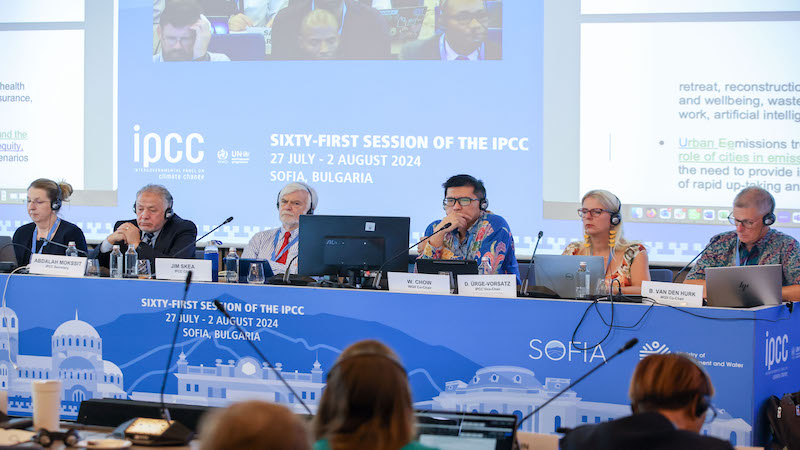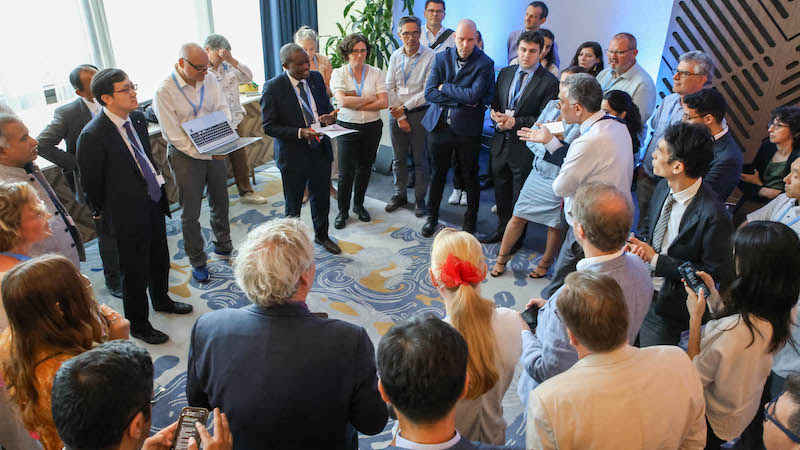Comment: An IPCC author from the Global South on why aligning the two timelines is crucial for the integrity of international climate cooperation
Dr Youba Sokona is an energy and sustainable development expert from Mali and was a vice chair of the IPCC’s sixth assessment cycle.
The Intergovernmental Panel on Climate Change (IPCC) seventh Assessment Report can and must be ready in time for the second Global Stocktake (GST).
The IPCC report plays a pivotal role in assessing climate change science and informing government decisions, especially in the context of multilateral negotiations.
The GST is a key element of the Paris Agreement, designed to evaluate the world’s progress towards long-term climate goals. It must be conducted “in the light of equity and the best available science,” underscoring the importance of IPCC assessments as a primary input for the GST.
As an IPCC author from the Global South, I believe that ensuring the IPCC cycle aligns with GST timelines is crucial for maintaining the integrity of international climate cooperation.
Efforts to enhance the inclusion of developing country voices should be prioritized over inordinate delays, which could risk the irrelevance of the IPCC report for the second Global Stocktake – taking place in 2028.
Concerns over accelerating process
A delayed production at the three IPCC working groups—which craft three reports covering the physical science of climate change, impacts and adaptation, and mitigation— is being justified under three main arguments.
First, those in favour of delaying the report claim that expediting the process could risk a lack of representation of underrepresented communities. A delay may impact the inclusion of voices from the Global South and non-English speakers, reducing the diversity of perspectives essential for a comprehensive assessment.
Comment: It’s time for Azerbaijan to shift gears on diplomacy ahead of COP29
Another argument is that the topics covered in the report could also be reduced in range. Ensuring a broad array of topics is vital for addressing the multifaceted nature of climate change and providing a holistic understanding.
Finally, delays would risk spreading out key messages from the different IPCC working groups. Timely integration of insights from the different working groups is crucial for a cohesive and comprehensive assessment.
Measures for inclusion
The IPCC’s role is to provide credible scientific assessments to the UNFCCC process and national decision-makers. Time constraints may lead to some compromises, but it is better to minimize these than to forego IPCC input entirely. The IPCC must ensure its assessments are available in time for the second GST to maintain its relevance and impact on global climate policy-making.
On the inclusion of underrepresented communities, ensuring representation is more about deliberate efforts than merely the time available. Creating networks for southern scholars, facilitating special issues in academic journals, and convening regional meetings can enhance representation.
Delegates convene in a huddle on the fourth day of IPCC-61 in Sofia, Bulgaria. Photo: IISD/ENB | Anastasia Rodopoulou
Focused attention on these efforts in the next IPCC cycle is more effective than strictly adhering to traditional timelines. My experience as an IPCC author from the Global South indicates that inclusion results from proactive initiatives rather than extended timelines.
Successive IPCC cycles have increasingly included literature from developing regions and better represented perspectives from the Global South. For instance, AR6 highlighted issues of equity, impacts o
Read More


